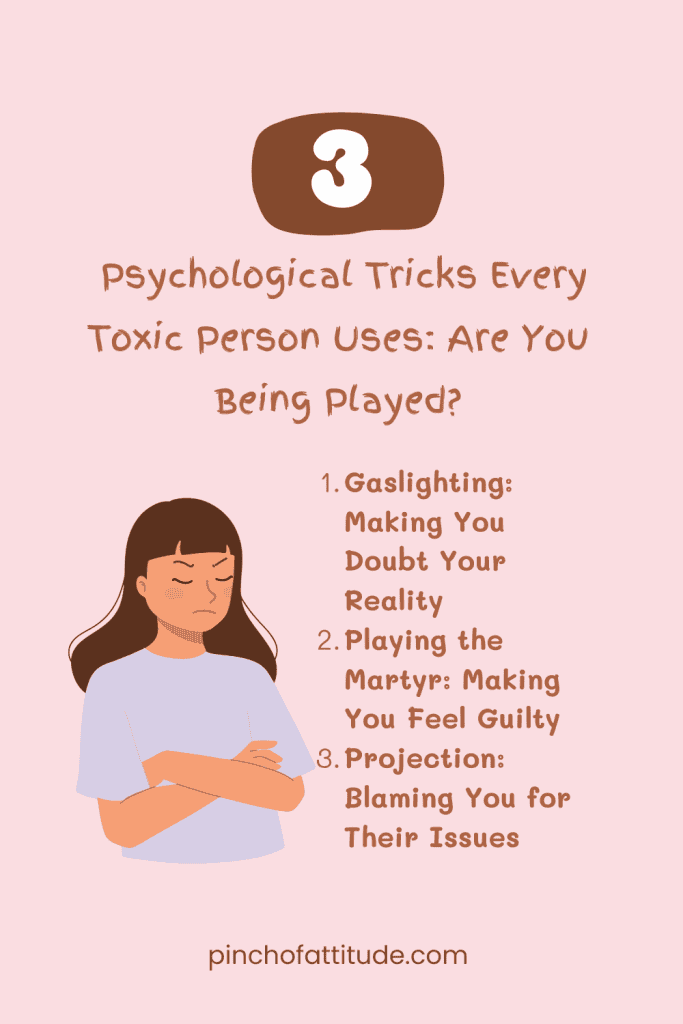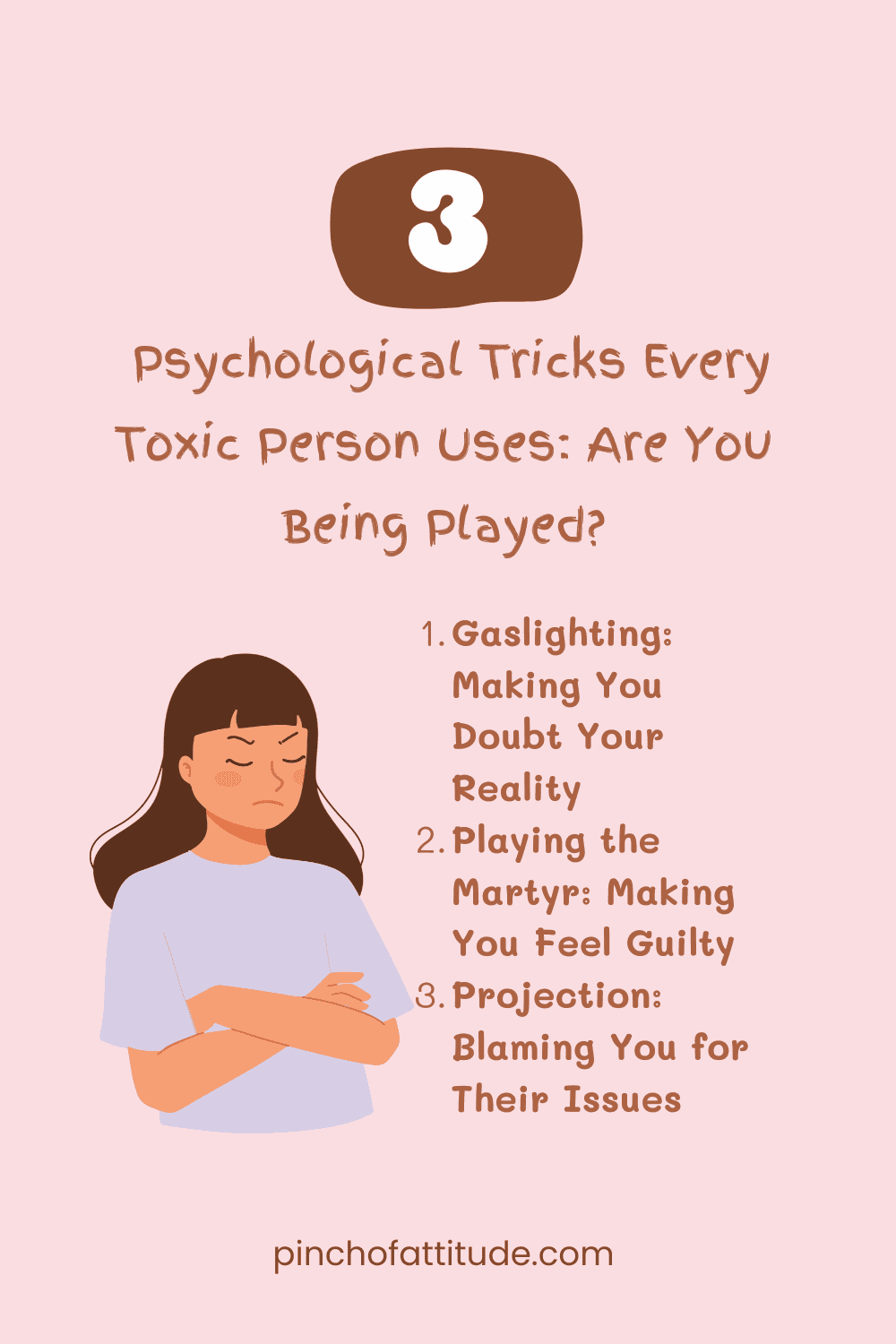You know, dealing with toxic people is like trying to navigate through a minefield while blindfolded.
These master manipulators have a special set of skills – not the Liam Neeson kind – but the kind that can mess with your head and leave you questioning your sanity.
Let’s dive into the top three mind games toxic people love to play with you. Trust me, once you spot these tricks, you’ll be better equipped to dodge their nonsense and keep your sanity intact.
- Recognizing gaslighting, martyrdom, and projection as common toxic mind games can help you protect your mental well-being.
- Understanding the psychological reasons why toxic people manipulate, such as their need for control and fear of abandonment, can empower you to set boundaries and avoid their traps.
- Awareness of your own vulnerabilities, like low self-esteem or a fear of conflict, is crucial in breaking free from toxic dynamics and maintaining healthy relationships.
Table of Contents
1. Gaslighting: Making You Doubt Your Reality

Imagine you’re in a funhouse, surrounded by distorted mirrors. That’s gaslighting. It’s a sneaky way toxic people manipulate you into doubting your perceptions, memories, and even your sanity. They twist facts, deny their actions, and make you feel like you’re the crazy one.
How They Do It
- Denial: They outright deny things they’ve said or done. You know it happened, but they’ll look you straight in the eye and say, “That never happened.” It’s like watching a magician’s trick and knowing it’s fake, but still being baffled.
- Twisting the Truth: They’ll mix a bit of truth with lies to confuse you. It’s like they sprinkle a dash of fact into a pot of fiction. For example, you might recall a conversation where they insulted you, but they’ll insist you misunderstood their words and that they were just “joking.”
- Playing the Victim: They flip the script and make themselves the victim. Suddenly, you’re the bad guy for even bringing it up. It’s a classic move: you confront them, and the next thing you know, you’re apologizing for hurting their feelings.
Real-Life Example

Imagine you confront your partner about a hurtful comment they made at a party. They respond, “You’re just too sensitive. I was only joking, and now you’re making me feel bad for trying to lighten the mood.”
How to Handle It
Call out the behavior calmly and clearly. Keep a record of events if needed. Trust your gut – you’re not losing your mind; they’re just trying to make you think you are. Stick to your facts and don’t get derailed by their emotional smoke screens.
2. Playing the Martyr: Making You Feel Guilty

Ever had someone do something “nice” for you, then hold it over your head forever? That’s playing the martyr. Toxic people use this tactic to guilt-trip you and manipulate you into doing what they want.
How They Do It
- Grand Gestures: They perform over-the-top acts of “kindness” and expect you to repay them tenfold. They’ll bring up these grand gestures anytime they need something from you.
- Emotional Blackmail: They’ll say things like, “After everything I’ve done for you, this is how you treat me?” It’s the ultimate guilt trip designed to make you feel indebted to them.
- Constant Reminders: They bring up their “sacrifices” every chance they get to make you feel indebted. For example, “Remember when I stayed up all night to help you with that project?”
Real-Life Example
Your friend constantly reminds you of the time they lent you money when you were broke, using it as leverage to get you to do favors for them. Every time you say no, they guilt-trip you by bringing up their past generosity.
How to Handle It
Set boundaries and stick to them. Don’t let guilt control your actions. Acknowledge their help but make it clear that their generosity shouldn’t come with strings attached. Politely remind them that true kindness doesn’t require repayment.
3. Projection: Blaming You for Their Issues

Projection is the art of blaming others for one’s own flaws and mistakes. It’s like a toxic person takes all their issues, wraps them up in a gift box, and hands them to you. “Here, these are your problems now!”
How They Do It
- Accusations: They accuse you of things they are guilty of themselves. Cheating? Lying? That’s all on you, apparently. It’s their way of deflecting attention from their own misdeeds.
- Deflection: When confronted, they deflect by turning the tables. Suddenly, it’s not about their behavior but about something you did wrong. It’s like arguing with a slippery eel; you can never pin them down.
- Playing the Innocent: They act like they’re perfect and you’re the one with all the problems. By projecting their faults onto you, they maintain their self-image as the innocent party.
Real-Life Example
You confront a colleague about missing a deadline, and they turn around and accuse you of being disorganized and unreliable, despite their own track record of dropping the ball.
How to Handle It
Recognize when projection is happening and don’t take the bait. Stay focused on the actual issue and don’t let them derail the conversation. Maintain your composure and keep the spotlight on their behavior. Use facts and remain calm to avoid getting drawn into their emotional game.
Why Do Toxic People Play These Mind Games?

1. Control and Manipulation
At the heart of these mind games is the toxic person’s need for control. They want to manipulate you to get what they want, whether it’s power, attention, or simply the satisfaction of seeing you squirm.
By keeping you off balance and doubting yourself, they maintain the upper hand in the relationship.
Control is a powerful motivator, and toxic people thrive on having the upper hand. It’s like a twisted game of chess where they are constantly trying to stay several moves ahead of you.
2. Avoiding Accountability
Toxic individuals hate taking responsibility for their actions. These mind games allow them to deflect blame and avoid facing the consequences of their behavior.
If you’re too busy questioning your own reality or feeling guilty, you won’t be holding them accountable.
They masterfully dodge responsibility by making you the scapegoat. This way, they never have to face their own flaws or mistakes.
3. Emotional Insecurity

Many toxic behaviors stem from deep-seated insecurities. They project their flaws onto others, play the victim, or gaslight to protect their fragile egos. It’s a twisted way of coping with their own issues by making them someone else’s problem.
These insecurities often trace back to their own experiences, such as childhood trauma or previous relationships where they felt powerless or unimportant.
By making you feel small, they can momentarily feel bigger and more secure.
4. Fear of Abandonment
Another driving force behind these mind games is a fear of abandonment. Toxic people often have a deep-seated fear of being left alone, so they employ these tactics to keep you tethered to them.
By confusing you, making you feel guilty, or projecting their issues onto you, they create a dependency where you are more likely to stay and try to “fix” things.
This fear can be so overpowering that they’ll go to great lengths to ensure you’re too disoriented to leave.
5. Lack of Empathy
Toxic individuals often lack empathy, meaning they can’t genuinely understand or care about how their actions affect others.
This lack of empathy allows them to manipulate and hurt others without feeling remorse. They see relationships as transactions rather than emotional bonds, using you as a means to an end rather than valuing you as a person.
This detachment makes it easier for them to engage in these harmful mind games without the burden of guilt.
6. Need for Validation
Validation is like oxygen for toxic people. They crave constant affirmation and attention, and these mind games are tools to ensure they remain the center of your world.
By making you question yourself or feel guilty, they keep you focused on them, constantly seeking their approval and validation.
This need often stems from a deep-seated lack of self-worth, driving them to seek external validation at any cost.
Why Do We Fall for These Mind Games?

1. Psychological and Emotional Factors
Understanding why we fall for these mind games can help break the cycle. Here are some reasons why toxic people can get under our skin:
2. Low Self-Esteem
If you have low self-esteem, you might be more vulnerable to toxic mind games. When you already doubt your worth, it’s easier for someone to make you question your reality or feel guilty. Toxic people exploit this weakness, making you feel even more dependent on their approval.
3. Need for Approval
We all have an inherent need for approval, but when this need is excessive, it can make us susceptible to manipulation. Toxic individuals sense this need and use it to their advantage, making you jump through hoops to gain their approval, only to shift the goalposts continuously.
4. Empathy
Empathy is a beautiful trait, but toxic people can exploit it. Your ability to understand and feel others’ emotions can be twisted into a tool for manipulation. They rely on your empathy to forgive their bad behavior, giving them more leeway to play their mind games.
5. Fear of Conflict
If you dread conflict, you might find yourself going along with toxic behaviors just to keep the peace. This avoidance can make you a prime target for manipulation, as toxic people will push your boundaries knowing you’re unlikely to push back.
6. Hope for Change
Sometimes, we hold onto the hope that toxic people will change. We believe that if we can just understand them better or help them enough, they’ll see the error of their ways and stop their manipulative behavior.
This hope keeps us engaged in the toxic dynamic far longer than we should be.
7. Social Conditioning
Many of us are conditioned to be polite, and accommodating, and to avoid making waves. Toxic people take advantage of this conditioning, knowing that you’ll likely tolerate their behavior rather than call them out.
This societal pressure to “be nice” can trap you in a cycle of manipulation.
8. Love and Loyalty
Love and loyalty can blind us to the reality of someone’s toxic behavior. We make excuses for them, rationalize their actions, and convince ourselves that enduring their mind games is a small price to pay for maintaining the relationship.
9. Lack of Awareness
Sometimes, we’re simply not aware of the tactics toxic people use. Without the knowledge of these mind games, it’s easy to fall victim to them. Education and awareness are powerful tools in breaking free from manipulation.
Related Posts:
Frequently Asked Questions
1. What is gaslighting in a toxic relationship?
Gaslighting is a manipulative tactic where a toxic person makes you doubt your own reality and sanity.
2. How can I identify if someone is playing the martyr?
A person playing the martyr will frequently remind you of their sacrifices and use them to make you feel guilty.
3. What does it mean when someone is projecting?
Projection occurs when a person blames you for their own flaws and mistakes.
4. Why do toxic people use mind games?
Toxic people use mind games to manipulate, control, and avoid accountability for their actions.
5. How can I protect myself from toxic mind games?
You can protect yourself by recognizing the tactics, setting clear boundaries, and seeking support from trusted friends or professionals.





Great article! I’m going through it all right now